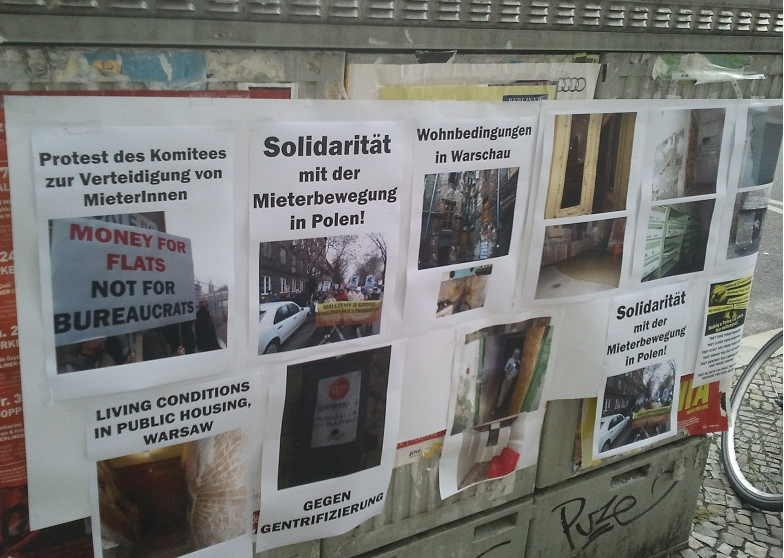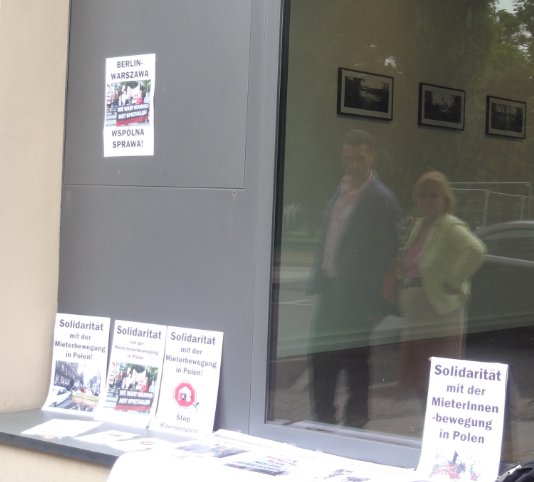English
Why Poland’s new law is not Anti-Semitic
In the last few days one can read many headlines in the foreign press about the latest amendment of the Code of Administrative Procedure (herein referred to by the Polish abbreviation, KPA). The sensationalist headlines read that Poland denies restitution to Holocaust survivors and refers, mistakenly to a Reprivatization Act or Restitution Act – neither or which were the subject of debate in the Polish Parliament.
Laure Akai of the Committee for the Defense of Tenants’ Rights questions the reporting on the new Polish legislation. Download her article as PDF below.
US Senators Invited to Warsaw to Discuss Issues of Property Restitution
In response to the letter of 59 Senators to the Polish government concerning a proposed Act on Reprivatization, social activists and a member of the Verification Commission have invited the Senators to visit Warsaw to learn more about the complications involved and discuss the issues.
During a press conference held at the Parliament, the signatories to the invitation explained their motivation and said that they invited dialogue on the issue. They pointed out that the current situation created both a high social cost as well as encouraged the actions of an organized criminal group which came into possession of a number of properties illegally. Adam Zielinski from the Verification Commission pointed out a number of addresses where foreigner citizens where also cheated.
Earlier in the day, Jan Spiewak from Warsaw Free City Association pointed out that it was essential to speak about the real costs of rebuilding Warsaw and to speak in a factual matter, with an aim to improve relations. Jakub Żaczek from the Committee in Defense of Tenants’ Rights also suggested that people in other countries may not be fully aware of what has been happening regarding reprivatization in Poland with a lack of regulation.
The invitation is printed below as an open letter. The Committee in Defense of Tenants’ Right has also uploaded a copy of a prior agreement between Poland and the US regarding compensation.
We look forward to a response.
Skomentuj US Senators Invited to Warsaw to Discuss Issues of Property Restitution
Fighting Gentrification
Government forced to change draft bill on revitalization, but many problems ahead for tenants
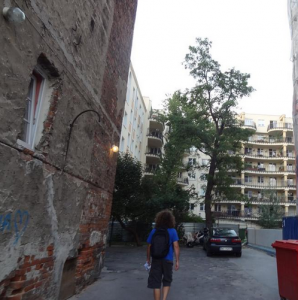 The Polish government plans are called „revitalization” and, officially, they claim that they have nothing to do with gentrification. In reality, the gentrification process has been underway in a number of urban areas for years, with thousands of families already displaced, made homeless or forced into overcrowded living conditions with friends or relatives.
The Polish government plans are called „revitalization” and, officially, they claim that they have nothing to do with gentrification. In reality, the gentrification process has been underway in a number of urban areas for years, with thousands of families already displaced, made homeless or forced into overcrowded living conditions with friends or relatives.
The unpopular Civic Platform government, whose neo-liberal policies have affected many spheres of social life, is set to be unseated in fall elections and has been busy pushing through as many pieces of legislation as possible at record pace. One of them was the Act on Revitalization, passed this week.
Various liberal elements, caught up in the idea of „revitalization” as a positive thing, have been involved in pushing the program and trying to socialize it. But more often than not, this „social” element does not have as much to do with protecting the interests of the urban poor with lofty civic ideas such as „participation” or „social consultation”. Thus the neo-liberal gentrifiers have also their assistance from the „municipal movements” – an umbrella term put on a wide range of local social movements, which in reality can differ dramatically in aims.
The government is very quick to pander to those who want to „participate” and „consult” – but in reality they are just promoting an illusion. They are eager to accept ideas which do not upset the neo-liberal world order: artistic and community projects, things to make the areas under gentrification more attractive to certain people. But ideas which guarantee the rights of the poor – which is a huge segment of Polish society – are just „not feasible” or bad for business.
The draft bill of the Act on Revitalization thus starts with a lot of bull about „consultations” and even civic oversight. But seeing how the bill itself was „consulted” says a lot about reality. The law in Poland already says that such bills should be sent to organizations for „consultation”. And the government did send it to 68 organizations. Not one of them however was a tenants’ organization.
The government sent their draft bill to employers’ organizations, business lobbies, a few „muncipal organizations” and even to the Tri-Partite trade unions. With no reaction. Had tenant organizations been consulted, they would have immediately reacted to the horror beyond the bullshit. The government was proposing that when buildings have to be repaired and tenants cannot inhabit them at that time, they would have the right to terminate public housing contracts. Maybe they could get new ones later, if conditions were right. The bill also foresaw giving the right to mayors or city presidents to evict people without a court decision.
The fact that the government did not contact any tenants organizations, although the revitalization plans will have a serious impact on them, shows what all their declarations about „social consultations” are worth.
The bill went through the first reading in Parliament without any opposition. Even the opposition claimed to support it. This is when it was brought to our attention and we read the bill. It was sent for further work to a subcommission and we had only a few days to try and block it.
Another tenants’ organization turned out to be better informed and we saw that they objected to this, but the government refused to remove or ammend these points. Fortunately, we were able to find a number of irrefutable legal arguments to show how these points were inconsistent with the Act on Tenants Rights, the Civil Code and the Constitution. We also showed where their plans would cost them big money they’d have to pay to tenants. We carried out a blitzkreig postering and SMS campaign and around 2000 protests were sent in 2 days. We mailed our analysis to everybody in the government and even insisted on speaking at the Subcommission meeting in the Parliament. They gave us a rough time but we got in. They locked out a representative of another tenants’ organization.
We know that our arguments were rock solid but we were still surprised when the government representative announced that they would drop the idea of termination of contract from the bill. We were expecting to have to fight, but no doubt they knew we were right and that the whole thing could be torpedoed and delayed. As it happened, the Act was rushed past in a few days.
While we were happy about this and think it was the most we could accomplish on that day, in no way do we share the optimism of the „revitalizers”, who only think that the Act has gotten better.
The first thing is that a certain part of the „revitalizers” are in denial that gentrification is underway and that they themselves are part of the act. Statements in the press such as „we have to make sure there is revitalization but no gentrification” show just how far they are removed from the problem.
Some Characteristics of the Gentrification in Praga Neighbourhood in Warsaw
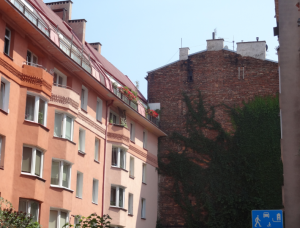 The area is attractive because it lies on the river, just across from the Old Town. It is one area of Warsaw not totally destroyed in the war, with many pre-war buildings. Although these buildings were mostly left to deteriorate, many are landmarks and have potential for real estate speculation.
The area is attractive because it lies on the river, just across from the Old Town. It is one area of Warsaw not totally destroyed in the war, with many pre-war buildings. Although these buildings were mostly left to deteriorate, many are landmarks and have potential for real estate speculation.
In 2009 the city raised rents on public housing 200-300%. The government and courts also started „reprivatizing” buildings at a much faster pace than before and divesting itself of public housing units.
Since there are very low wages, high hidden unemployment and insufficient social help, many tenants fell into debt. The city’s way of dealing with debt has lead to an epic problem. When any tenant falls behind the rent, the city terminates their rental agreement but usually allows them to continue living there, charging them double rent as a penalty. So, for example, somebody who had trouble paying 150 euros a month is suddenly charged 300 euros. Thus the debt grows twice as fast and is compounded by interest. Every week we meet people who have enormous debts. The city also puts the debt on other members of the family. We often meet teenagers who start their first job (earning 300 euros a month) only to find that the bailiff has sequestered part of the salary and the city plans to get 10,000 euros or even more from them. (We even saw last week a young woman who is being charged for her mother’s debt of 25,000 euros.)
If a debtor manages to get a better job, which would help him or her pay off the debt, they risk losing the right to any public housing. The debtors are in a no-win situation. If they continue earning little money, the will never pay off the debt. If they go out at manage to find a job at 500-600 euros a month, they might be able to start paying off but may be evicted without the right to any public housing. Rents on the private market start at about 300-400 euros per month.
6 years after the infamous rent hikes, 50% of all public housing tenants in Warsaw and 60% of all tenants in the Praga neighbourhood are in debt.
The majority of public housing debt, as we were able to show a few years ago, is caused by penalties imposed by the city.
If somebody does not pay their rent for 3 months, the city can terminate their rental agreement. Without a valid rental agreement, the city can bring a case to court to evict you.
But there are a lot of other reasons why the city can terminate your agreement. And we noticed that the city has been speeding up the terminations in the last few years. And seeing this, we know that the city will be able to throw a few hundred or maybe even a few thousand more people out of the public housing system. What the government wanted to do is to be able to terminate with even greater ease.
One of the common reasons to terminate an agreement in Praga is „repairing the apartment without the permission of the owner”. Now let’s see what this means in reality. Praga is a neighbourhood were public housing is concentrated in old buildings. 70% don’t have heat, 40% were without bathrooms. Toilet in the corridor. But in the last decades, hundreds of people have managed to build toilets or small showers in their kitchens at their own cost. Several people we know have had their rental agreement terminated because of building a toilet.
It is completely scandalous that the city has let thousands of families live without a toilet and has not bothered to deal with this situation. It is even more scandalous that people are being punished for taking matters into their own hand in face of this negligence.
Another common reason to terminate an agreement is that somebody lives in the flat without the agreement of the owner. For example, a person invites a girlfriend or boyfriend to live with them without thinking they need permission and they can lose their flat. It should be mentioned that we know situations where people have asked permission but have been turned down because the housing would be overcrowded. For example, we met a couple with a child who have been living together and decided to „legalize” the partner and child. When they did, the city claimed the house would be overcrowded. Since they revealed themselves to the city, they lost their rental agreement.
What has happened to all these flats from which people have been evicted? Hundreds of them (about 1500 in north and south Praga) are empty. For different reasons. First is that there may be reprivatization claims to them. If there are claims, the policy is not to give flats there. Second is that the city plans to renovate some of them and some of them will be made into more expensive housing. The rent will be about 250% higher than at present. These flats will be made by a public-private partnership and will go to people who earn more than public housing tenants.
Already before the „revitalization” money has been found for the repairs, we know two buildings whose tenants have been removed – one will eventually be for more expensive flats, the other for office buildings.
But of course one of the biggest problems that tenants have had to face is „reprivatization” of public housing. In theory, the reprivatization is to return housing which was taken over by the Bierut Decree after the war, when most of Warsaw was destroyed and there was a severe housing shortage. But in fact, the process has been fraught with corruption and mafia-like dealings, with many buildings ending up in the hands of a few well-placed people.
The city, courts and other institutions are involved in the scheme. For example, Warsaw has returned buildings and land which it has already paid compensation for decades ago. We have encouraged tenants of buildings undergoing reprivatization to request information from the Ministry of Finance asking whether they paid compensation for their building. The answer has always been that they don’t know because they „don’t have a list” of which building were paid for. But when this situation concerned the American Embassy, all of a sudden they were able to assert that the compensation was already paid. Shortly after this, a list was leaked and published. Dozens of buildings were „returned” when they had already been paid for.
But „returned” is the wrong word. There are some buildings which are actually returned to the children of some pre-war owner. But mostly a small group of speculators connected to people in power buy up claims.
One of the most notorious „collector of claims” is Marek Mossakowski, who once convinced an old woman that her claim was worthless and bought the „piece of paper” from her for 50 zloties (12 euros), eventually getting his hands on a building worth millions. Mossakowski bought the building of our friends and fellow activists, Jola and Ewa. Jola, who was a fighter and the last one last in her building was murdered – burnt alive in the woods. Ewa went to live in the woods and was sued by Mossakowski for her „debts”.
Despite the drastic stories of tenants unlucky enough to fall into the paws of Mossakowski, we can say that the city is even selling public housing units to him – units together with tenants. A group of tenants have decided to fight back. Mossakowski bought the claims for the land. (It’s complicated to explain how the Decree worked but there are some people who own the land, but not the buildings on them. In this case, the building was put up after the war and, like many, was built by the tenants themselves.) Since there is a building on it which the city is part-owner of (having sold some of the units to tenants), the logical thing to do, if there was a claim, would be to pay compensation for the land. But instead, they offered to sell the public housing units to the notorious landlord.
Such deals have happened all over Warsaw. In this way, the city has been depleting its public housing stock to the benefit of private owners. The city has even sold entire buildings which have no claims at all.
It has to be noted that they privatize housing together with tenants. In theory, part of the tenants, are entitled to get a new flat – but not all. It takes a long time. The last time we had any statistics from the city, only 2.5% of such tenants managed to get replacement housing. We think there has been an increase from that time, but only a fraction of affected tenants return to public housing units.
The result of all of this is that lower-income people in public housing have been losing their flats in the Praga district at an alarming rate. A large number of them refuse to go anywhere and fight their evictions or are waiting for more affordable options. They are currently in their flats „without permission” and without a valid contract.
When the government gets their first flow of co-financing from the European Union, the games will begin. Several buildings which currently stand alone among new investments for yuppies will probably be the first in line for total repair. The tenants will be moved.
As the press reports, a recent program like this in the city of Lodz has resulted in only 30% of the original tenants returning to their old homes. Lodz is seem by the government, liberal press and some municipal activists as the „model” program for revitalization.
Fighting Back
In the past years, a once vibrant tenant movement was weakened by politics. Several people were bought off and some people bought into the political system, insisting on talking endlessly with politicians instead of building a combative grassroots movement. Of the various groups that formed at this movement’s peak, only we have stayed on the grassroots strategy. Realizing that all this nonsense the government is offering is just a distraction and a way to fool people, we have a long road ahead of community self-organizing.
Ultimately, the „consultations” we are offered are useless. We need to speak from a position of community power and demand the right to make decisions ourselves – not to „consult” the decisions already made between the government and the private sector.
The fight must include the right to stay for all those who want it. The bourgeois want to divide us into „good tenants” and „bad tenants”. The „bad tenants” are the ones too poor to pay, with huge debts, some of them created out of the bad will of bureaucrats. The strategy of the bourgeois is to get tenants against each other so that they will not fight for each other and will be easily conquered.
Fighting back will be a difficult process. There is some local base after years of work and, despite the best efforts of the neoliberals and the distracting options of „municipal activists”, advocates of running in elections, etc. etc., most people see through the bullshit. But years of being harrassed by housing bureaucrats has worn down people’s confidence.
Prominent municipal activists are telling stories of the great revitalization efforts in Berlin or Leipzig and building dreams in the hipsters minds. In the meanwhile, local residents lose sleep over their precarious future.
The Tenants Defense Committee invites support from organizations around the world which have fought or are fighting against gentrification.
Contact: obronalokatorow@gmail.com
Solidarity in Berlin
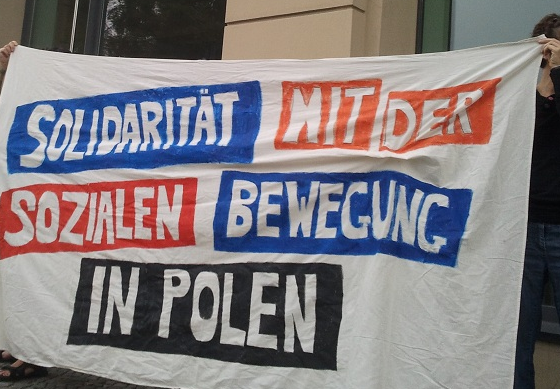 On August 24, a solidarity action took place in Berlin with the tenants movement in Poland. Informational exhibits were hung all around the Polish cultural institute on the tragic state of public housing and tenants rights in Poland which drew lots of interest from passersby. Leaflets were distributed in many languages. Afterwards, more photos were hung around Berlin and an exhibit put at the tenants’ protest camp in Kottbuser Tor. Our colleagues from Berlin offer best wishes and solidarity to activists from Poland and encourage people not to give up the struggle!
On August 24, a solidarity action took place in Berlin with the tenants movement in Poland. Informational exhibits were hung all around the Polish cultural institute on the tragic state of public housing and tenants rights in Poland which drew lots of interest from passersby. Leaflets were distributed in many languages. Afterwards, more photos were hung around Berlin and an exhibit put at the tenants’ protest camp in Kottbuser Tor. Our colleagues from Berlin offer best wishes and solidarity to activists from Poland and encourage people not to give up the struggle!
For the last few years, residents of many cities in Poland have been fighting against the desperate housing situation. First, there is too little public housing. Rents have been increased and there is a tendency to privatize and commercialize these flats. There are tens of thousands of families waiting and they cannot afford rents on the commercial market, because prices can be higher than in Berlin. At the same time, despite the myth of Polish economic growth, many people earn 400 euros a month or less. The unemployed, disabled or elderly must live on much less than that.
How can a family afford housing, for example, in Warsaw, where typical prices are about 2000 euro a meter and more for some flat? The answer is that they cannot and few people qualify for bank loans anymore. These means that hundreds of flats built by foreign investment companies remain empty. In the meanwhile, many families live in overcrowded conditions with nowhere to go.
The situation is made worse by the criminal activities of a small group of people who specialize in privatizing housing which was private before the war. The tenants of these houses, who had municipal housing contracts, are transfered to private owners, with no continuity of their municipal contract. Thousands of these people then find themselves in tragic situations, not able to pay the rent or with a new landlord which tries to get rid of them by cutting off heat, electricity or water. The authorities do nothing to protect these tenants, despite the laws that theoretically protect them.
In the worst cases, the end can be tragic. For example, Jolanta Brzeska, tenants activist fighting with her landlord, was taken to the woods, set on fire and killed. Many now are facing the tragic consequences of new policies which allow eviction onto the streets, despite this being against the Constitution. People are not being offered temporary shelter, or, if they are, only for a small time. This does not help them and is creating a wave of homelessness.
We especially show our solidarity today with Ewa, who was evicted from her home a couple of weeks ago with a huge police action. Put out into the street and in a state of shock, she had an accident and was hit by a truck. She had to have her leg amputated, so now she is homeless, with no job and still with no help from the city. Today she has to have another operation so we wish her strength.
For all these reasons and more, we are making this rally, in solidarity with the movement which is fighting for the dignity of tenants and decent housing conditions for all. It is part of a larger social movement in Poland, which is growing because the gap between the rich and the poor is wide and most people are on the side of the poor, victims of a system that places private profit above people.
More information: lokatorzy.info.pl
Horrible Eviction Ends in Tragedy
 URGENT SOLIDARITY APPEAL BELOW! WOMAN DISABLED AFTER BEING THROWN OUT INTO THE STREET
URGENT SOLIDARITY APPEAL BELOW! WOMAN DISABLED AFTER BEING THROWN OUT INTO THE STREET
We are calling for support for our friend, who was made homeless by the heartless policies of the state and who now is in a tragic situation.
Ewa was evicted from her home by force and, a few days later, still in a state of shock, she was hit by a truck. She had to have her leg amputated. Now she is without a roof over her head and may not be able to support herself for a long time. Ewa was a low income earner. It is difficult in Poland for older women on the job market and the type of work she received was part-time dishwashing. The restaurants try to avoid hiring anybody full-time to avoid paying benefits.
Ewa lived in state-owned housing. People like her are in a precarious situation, which is made worse by speculators looking to make more money off real estate. Tenants who have low rents are treated badly, as if they were burdens.
The state owners (a state owned agency, WAM, and not the municipality), decided to kick Ewa out under the pretext that her rental contract was in her dead husband’s name, and not hers. For years, she had continued, like thousands of other family members, to live in the flat and pay the rent. But WAM routinely kicks out families, as many recent incidents prove it.
City officials, in an apparent show of force to the tenants, decided to use force to evict Ewa on August 6.
Although Ewa has a very low income which would qualify for social housing, the local council denied it to her. The reason, we were told, was that she was not yet homeless. Although the city knew she was being evicted and ordered the police to prevent anti-eviction activists from stopping the eviction. It seems that the city officials think people should wait until they are made homeless, before they can apply for social housing. Apparently, spending a few months out in the street is nothing to worry about.
In October, the first attempt by authorities to evict Ewa was successfully blocked by activists. But the second attempt sadly ended in Ewa becoming homeless. This time, a squadron of police and riot police was used. Ewa lost consciousness during the action and was hospitalised.
She was offered no help at all by the city authorities. She was just thrown out on the street.
A few days later, still suffering from the shock and trying to find a place to stay, Ewa was hit by a truck. She was gravely wounded and as a result, she had to have her leg amputated. Now, besides being homeless, she has to face disability.
The Committee of Defense of Tenants is collecting money for a wheelchair, prosthesis and housing.
Please donate what you can. On the transfer, write “For Ewa”.
Bank details:
Jakub Gawlikowski
(PL) 05 1140 2004 0000 3702 4238 2269
BRE Bank S.A. Retail Banking, al. Mickiewicza 10, 90-050 Łódź
BIC/SWIFT: BREXPLPWMUL
SORT CODE: 11402004
You can watch a movie from a previous blockade of eviction here: https://lokatorzy.info.pl/eksmisja-na-ul-sempolowskiej-zablokowana/
Sadly, this time the police removed the protesters by force.
Ewa is an activist herself, and has many times participated in blockades of evictions of other people.
Eviction Blocked on Lojewska St.
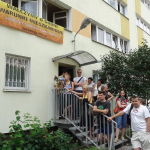 Members of KOL blocked the eviction of a 70 year old woman from her flat on Lowejska St. The woman, who has been ill for many years, lives with her son, also ill, who receives 388,84 zloties a month (about 95 euros) as an invalid. Although these people cannot possibly find any work and would not be able to pay for even a small room if they rented from a private owner, the city wanted to evict them, as we say “on installments”. Because before, these people would have been protected from eviction, given help and social housing. Now they would be evicted for 3 months to the shelter on Przeworska St.. And after that, they’d be out on the street.
Members of KOL blocked the eviction of a 70 year old woman from her flat on Lowejska St. The woman, who has been ill for many years, lives with her son, also ill, who receives 388,84 zloties a month (about 95 euros) as an invalid. Although these people cannot possibly find any work and would not be able to pay for even a small room if they rented from a private owner, the city wanted to evict them, as we say “on installments”. Because before, these people would have been protected from eviction, given help and social housing. Now they would be evicted for 3 months to the shelter on Przeworska St.. And after that, they’d be out on the street.
Thanks to direct action, the eviction was blocked.
Family in Dire Situation Helped
A couple of weeks after contacting us, a family who had got into debt was helped. They are not required to pay this huge debt, their rent has been reduced and they are able to stay in their flat. It was another one of countless interventions in individual cases that ended in success.
What is more, we have been pressuring the city on this issue. We managed to force them to make an analysis of the tenants’ debt in public housing and it was clearly shown that the main reason for rising debt is the city’s decision to penalize tenants already in debt. We’ve made demands that these policies change. We will see what kind of pressure we can gather and hope that something will be done to stop this horrible policy.
Euro Reality Tours Highlight Problems with Gentrification
During the first days of the EURO, tours were organized around the Praga neighbourhood of Warsaw for tourists and locals who would like to see some historic and interesting places before they are destroyed and the reality of the public housing situation. The intent was to give tourists visiting during the EURO a chance to see the reality of life just beyond the new National Stadium.
The local authorities were angry at these tours and comments by internet readers were not allowed in the main newspaper. Just days before the tours, crews could be seem making quick paint jobs and putting up banners on buildings in the immediate area of the stadium. Even more absurd for visitors as they only painted some entrances on the street but going into courtyards, anybody could see the reality.
Dozens of people came on the weekend and the tours were organized in four languages. Surprisingly, the most interest was from Varsovians, some of whom even came more than once and asked us to expand the tour to other parts of the neighbourhood. Members of the media also came and the main free daily put the tour on the front page on Monday, with a personal opinion from the author who was quite shocked at what was shown.
Euro Reality Tours Highlight Problems with Gentrification – czytaj dalej …
Skomentuj Euro Reality Tours Highlight Problems with Gentrification
Action against the Euro 2012
 On June 8, the Euro Cup opened in Warsaw. The city was full of police, military police and football fans. ZSP and the Tenants Defense Committee organized a protest against the politics of the Euro. The protest was at the main roundabout on the way to the stadium, so thousands of people passed by. People spoke about the money spent on the Euro and the fact that UEFA (which was exempted from tax in Poland) and a few businesses would be big beneficiaries, but that the public has spent already almost 26 billion euros on the spectacle and working people are footing the bill. At the same time that Poland is spending a lot of money on games, children will go hungry as the city privatizes school cafeterias, makes cut in social services and raises the price on everything.
On June 8, the Euro Cup opened in Warsaw. The city was full of police, military police and football fans. ZSP and the Tenants Defense Committee organized a protest against the politics of the Euro. The protest was at the main roundabout on the way to the stadium, so thousands of people passed by. People spoke about the money spent on the Euro and the fact that UEFA (which was exempted from tax in Poland) and a few businesses would be big beneficiaries, but that the public has spent already almost 26 billion euros on the spectacle and working people are footing the bill. At the same time that Poland is spending a lot of money on games, children will go hungry as the city privatizes school cafeterias, makes cut in social services and raises the price on everything.
Someone from ZSP also pointed out that the general contractor which built the National Stadium in Warsaw declared bankruptcy earlier in the week because of problems receiving payments. This means that a whole line of subcontractors and workers have also not been paid. They threatened to block the opening of the Euro, but didn’t. The workers at the stadium for the Euro, who are being cheated and receive less money than promised, threatened to strike – but didn’t. This sort of situation, where many workers are not organized and are beaten with defeatism in a country with concillatory unions, is creating more and more social problems. The protestors called on people to organize themselves against these types of abuse.

A guillotine was brought and the demonstrators declared that if the politicians continue as they are going, they might have to use it. Instead of more social cuts, the only thing we want cut are the heads of the government.
Action Against Local Government
Members of the Tenant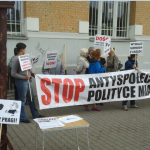 s Defense Committee and ZSP took part in an action yesterday against the local government. There is now a campaign to get rid of it and it seems that there is a lot of support.
s Defense Committee and ZSP took part in an action yesterday against the local government. There is now a campaign to get rid of it and it seems that there is a lot of support.
(It should be mentioned that the board of the local council is not even democratically elected, but was appointed by the President of the city. And it is extremely anti-social in politics.)
The trickier question is what comes next. Both organizations have called for more popular control, public assemblies, etc. Of course, nothing really libertarian can function within the framework set up by the state, only outside of its realm. The grassroots movements have to be built up, which is an enormous task given the realities of society in Poland.
In the meanwhile, people would like to send a message that those who engage in anti-social actions cannot do so with impugnity.
